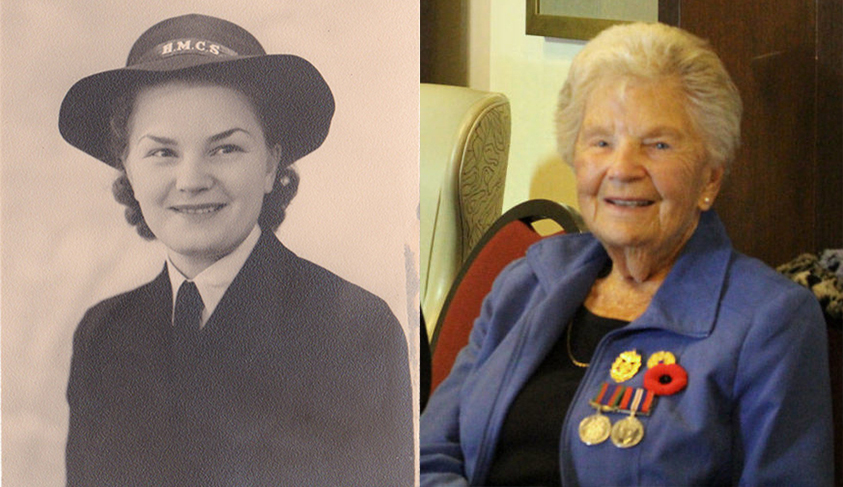
Getting to 100 years no puzzle for USask alumna
Veteran, who came to USask to get her education after Second World War, was awarded the Bletchley Park Commemorative Badge awarded by the U.K. for all “Silent Listeners” (i.e., code breakers associated with Bletchley Park).
By John GraingerCompleting her daily Wordle puzzle is how one of the oldest living University of Saskatchewan (USask) alumni likes to get her day started.
Alice Adams (BA’48), who turns 100 on April 21, likes to stay sharp every day by tackling the popular word-solving game at her home in Victoria, B.C.
“My goodness, what a fascinating age we live in and all the technology that’s out there,” Adams said. “We’ve come from the horse and buggy age to the space technology. It’s unbelievable. Unbelievable.”
Before Adams arrived at USask in 1946, she had spent some pivotal years in the Canadian army as part of the WRENS (Women’s Royal Canadian Naval Service), Canadian women who supported the Allied war effort. Adams was among the first women to be selected to work as wireless telegraphists where she tracked enemy submarines and boats.
“For people like me, who weren’t really in danger, but we knew about the dangers the men particularly faced, it was a big adventure,” Adams recalled. “It was a chance to learn a new skill and you were doing a duty, but you were enjoying what you did.”
Adams, born in rural Saskatchewan, was known to her military friends as Ruddy, a derivative of Rutherford, her maiden name. She came to Saskatoon to enlist for duty and was sent east for military training.
On April 30, 1945, a colleague of Adams intercepted a message from a Nazi German general confirming that Adolf Hitler had died. Adams was the first person to get that message and send it out to the Allies.
Once the war ended, Adams returned to Saskatoon. Returning military personnel were allotted space at USask at what was called Carson College, located near the airport. She remembers esteemed USask professors such as Carlyle King coming to Carson College and delivering lectures.
“When we came back from the war, we got $60 a month, and that paid for your tuition and your books. And most of us, of course, had to augment it, so I worked in the library,” Adams recalled. “There were five of who worked there and we received 50 cents an hour shelving books. And that kept us going.
“That’s probably a main reason why I eventually went into library science.”
After her USask graduation, she accepted a scholarship to go to Montreal’s McGill University where she obtained a library science degree.
Adams then married, had three kids and took up residence in Ottawa where she remained until 1985 when she moved back to the West Coast.
Adams is very aware of Russia’s attempted takeover of Ukraine and it takes her back in time to when Nazi Germany was on the move across Europe.
“When I see what is happening in Ukraine, I think, my God, it’s starting all over again.”
However, Adams does have hope that changes since the Second World War might thwart Russia’s advances.
“Wonderful things came out of the war, all those wonderful institutions like a world food program and a focus on world health,” she said. “We have a basis now that we didn’t have before.”
She’s proud of her family and is close to her children now and is very content with life in Victoria.
“I’ve lived a darn good life. If I dropped off tomorrow, that would be fine, too.”

